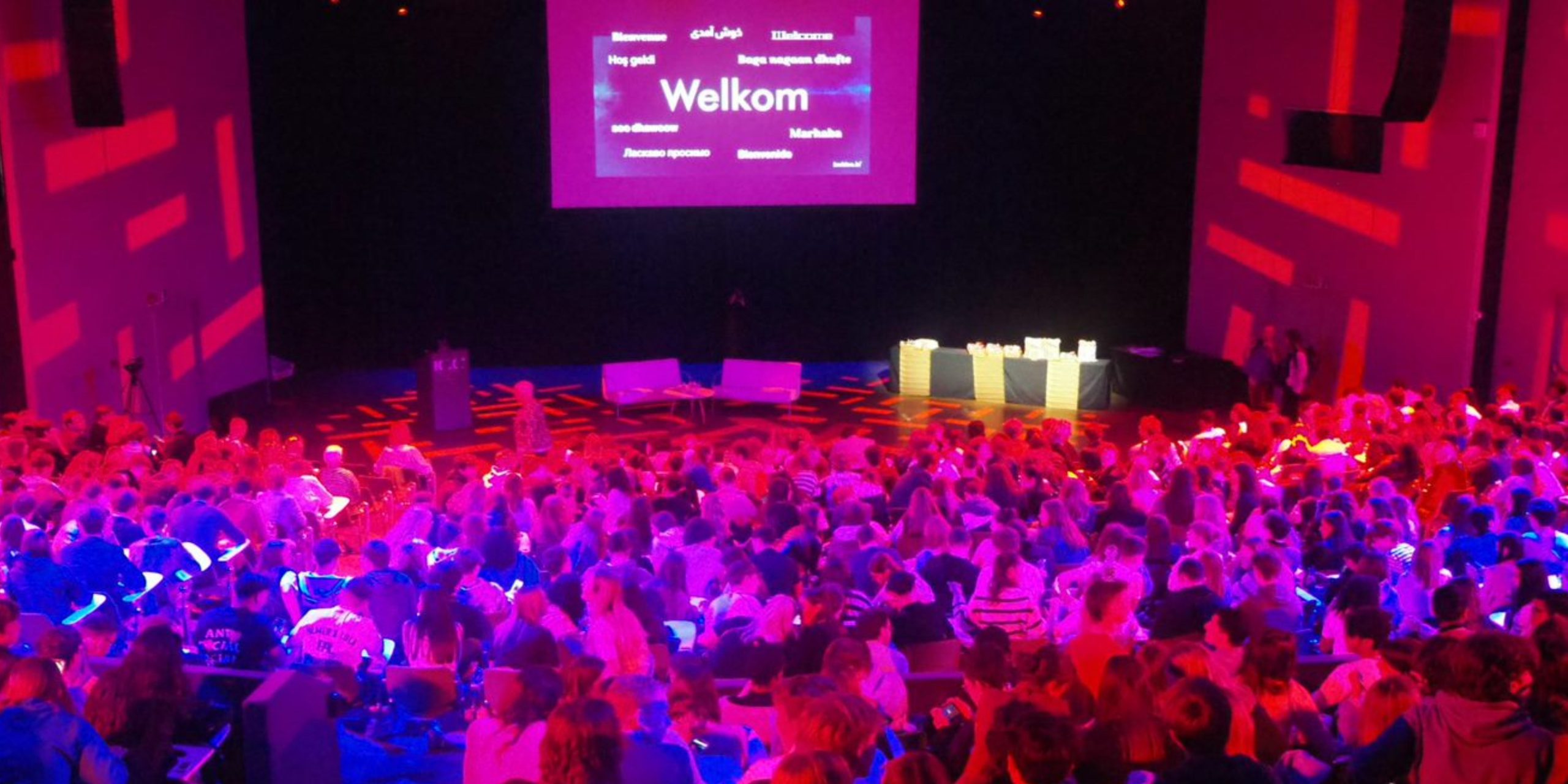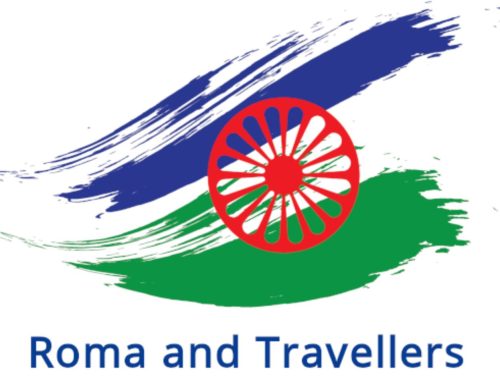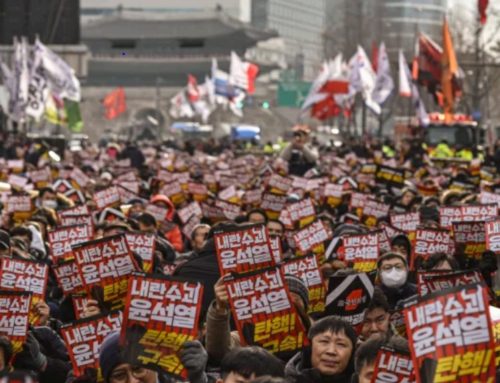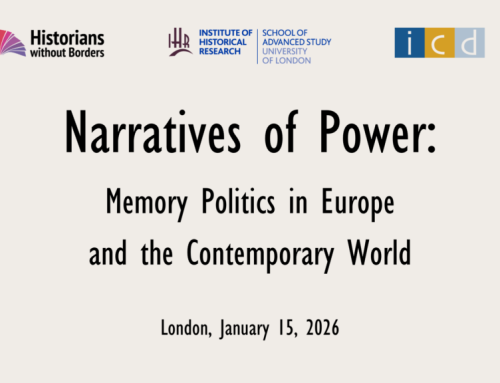In this interview, EuroClio’s trainees, Andreas Haraldstad and Laura Fernández-Pampillón Enguix explore the innovative educational initiative, the Vlaamse Geschiedenis Olympiade (Flemish History Olympiad), with its creator and coordinator, Naïma Lafrarchi. This unique project redefines the traditional concept of Olympiads by focusing on history and humanities, encouraging students across Flanders to engage in comprehensive, creative innovative history projects from September to May. By aligning with key competencies and Sustainable Development Goals (SDGs), the Olympiad not only enhances historical knowledge but also fosters critical skills, project management skills, agile working and, most important inclusivity. Naïma Lafrarchi provides insight into the motivation behind the project, its integration with the curriculum, and its significant impact on students and teachers.
Andreas Haraldstad: Hi Naïma, it is very nice to have you here with us! We have prepared some questions, but in general we just want you to tell us about your project and what it is that you’ve done because we’re very interested to hear about that.
Naïma Lafrarchi: It’s called Vlaamse Geschiedenis Olympiade. It’s translated as the Flemish History Olympiad but it’s important to understand it’s not like the Olympiads most people know for math or physics. It’s really another way of teaching history and social science in general. Our Olympiad invites also students of social sciences, citizenship education, cultural sciences, art, and so on to participate. Here in Flanders, we call it ‘the humanities’. The aim is to invite every pupil, regardless of their background—social, ethnic, language, religion, newcomers—to participate. It’s a project that involves the teacher(s) and their entire class.
That’s why it’s different from other Olympiads. It involve everyone in the classroom, guiding them through a learning path from September to May achieve competencies directly linked to their curricula and SDGs. We do not organise exams. Hence, they choose to make a documentary, podcast, website, art construction, or a city tour focusing on historical aspects. The competences and learning goals are integrated in the design of the project they develop. By so and working on it almost a school year long, it is obvious that the students are evaluated by their teachers.
We know exams stress pupils, so by asking them to make a project, we encourage creativity, innovation and a different approach. They still need to acquire knowledge, skills, and attitudes, like history content, critical sources analysis, but also digital media literacy, group work, and communication.
Andreas: So the Olympiad lasts from September to May and the students are to fashion a project where they answer a (research) question. Are the questions crafted by themselves or do you give them the question?
Naïma: No, the historical theme they work on is chosen by themselves. The research question is linked with that theme. We encourage and give them ownership to the students. We provide support in the early stage of the process for teachers and pupils. Actually, we only formulate an overarching theme. For example, the first year it was “Forgotten Histories” Last year, the theme was “Searching for World History in Your Neighborhood.” The coming school year it is “History all over the place. I see want you don’t see.”. The overarching theme aims to trigger the pupils to think further than they maybe are used to do, to be creative, to discuss historical subjects. We observe that this approach makes them curious and encourages them to be creative. So, it is interesting to see that even when two classes work on the same theme – for example World Wars, migration, Women Rights, Colonisation – the outcome can be different. We also organise an exposition where all the students present their work. There they realise that historical events and phenomena can be approached from a multiperspective way.
Laura Fernández-Pampillón Enguix: But if this is something that you work on in class for a few months, how does this align with the normal curriculum that they have to follow?
Naïma: We don’t have fixed topics. We have a (new) framework of concepts (knowledge, skills and attitudes), and the teacher is free to choose how to achieve the related learning goals and competencies. For example, World War or migration will come up often. The teachers are now allowed to choose the perspective, the approach, the specific elements they want to teach. This gives teachers the possibility to work on history analysis, critical reflection, source competencies, and more, integrated into the project taking to account class specific elements. Teachers have to present what they are working on and how it aligns with the learning goals set by the Flemish government.
Andreas: So, does the whole class participate as a whole, or do they participate in smaller groups?
Naïma: A teacher can only participate with the entire class. The starting point is that the whole class work on a ‘history’ research question from September till May. They have the liberty to choose their subject, whether it’s World War, women’s rights, art, migration, or any other topic.
Laura: What gave you the idea to start this project, or what motivated you to start it? And where do you see this going in the future?
Naïma: That’s a question everyone asks. I’m an educationist, social scientist, and lawyer. But, more important I have always been sensitive to diversity and inclusion. I’ve worked on these issues for more than 25 years. My content wise background in diversity and inclusion (I wrote a thesis about Equal Chances implementation as lawyer and social scientist), my affinity with target groups in society, my work in Flemish administrations, and my experience in education all came together. I wanted to create something that foster and strengthen inclusion, gives every youngster a sense of belonging through and with education field. And at the same time offer them a rich learning environment. This project involves almost 1,500 people from all over the country (second edition!). To see them coming together to show what they’ve learned and accomplished, it gave them a fantastic feeling of self-esteem, and confirmation that they are part of a much larger community of pupils. It makes me genuinely happy to see them and their teachers all together showing proudly their creative innovative historical project!
Andreas: How do you ensure that the projects align with the learning goals and competencies?
Naïma: First, we stay in close contact with every teacher(s) participating during the school year. Second, we have a standardised method to monitor and evaluate the process and goals they are working on. This way, we can ensure that the projects meet the required education standards.
Andreas: What makes this approach different from other competitions like Math Olympiads?
Naïma: Our approach is holistic. Our project runs from September to May and involves continuous learning of all the pupils participating in class. We work on knowledge, skills, and attitudes, covering at least nine key competencies and at least five SDGs. We encourage transversal and interdisciplinary collaboration. To achieve this, we support the teachers all along the way. To do so, we have 30 course expertises (still growing; with master level certificate of competence!). It’s not just about history but about prepare and support them for the future. In a larger way: making students sensitive to broader educational and social issues through an innovative and digital method.
Andreas: You mentioned working with partners and experts. How does that work?
Naïma: We have more than 65 partner institutions (museum, heritage, culture, arts, …) and more than 85 experts in the country who provide expertise. These experts cover a wide range of topics, from maritime history to World War over migration, oral history, family history, Women in Middle Ages. Basically, we cover history time from Roman Empire till now. But also: archive researching, critical sources analysis, ICT, … Teachers can choose an expert to invite to their class or visits to museums, archives, and other places. We take over all the administrative coordination and organisation of it.
Laura: Can you tell us about some successful projects from previous years?
Naïma: We’ve had many successful projects. Last year, the first prize went to a divers class which worked on migration by using a family photo. The challenge was ‘link places and years in the photo’ to historical event over the world. By, doing so, they learn in an indirect way about world history. They presented their research findings in a short film. This year, a special needs class [forms of autism] won the second prize for their excellent work. They made a documentary about the biggest military cemetery in Limburg/Flanders. Another was by a school whose building is a heritage site. They worked on the heritage of the school and the city, linking it with World War history. They wrote a theatre play that they played for a larger public with well known Flemish actors. A technical school (electricity, woodcraft and metal techniques) made a model of a mine site. The openness and the inclusive approach of our develop method allows every teacher and class to participate, making them feel comfortable and included.
Andreas: What are your plans for the future of this project?
Naïma: We will start the next edition in September 2024. We invite every teacher and class regardless of the type of education or course of study to participate. The overarching theme will be launched on social media and our website. We work with a large network of partners and experts to provide support and resources. We still have organisations and institutions who want to join our network platform Flemish History Olympiad. Our goal is to continue growing the project and involving as many students and schools as possible. We are open to share our knowledge and expertise with other history teachers and organisation abroad, of course. In that sense, I was invited by our Minister-President Jan Jambon to present the Flemish History Olympiad at the EU-Presidency Conference in April 2024. This was an honour for us!
Laura: It’s clear that this project requires a lot of time and effort. What keeps you motivated?
Naïma: Seeing the students’ growth path, having fun while learning and contribute to the sense of belonging to a larger value driven community keeps me motivated. The positive feedback and enthusiasm from participants encourage me to continue and expand the project.
As the interview concluded, it became evident that the Vlaamse Geschiedenis Olympiade is more than just a competition; it’s a transformative educational experience. Naïma’s dedication to fostering inclusion, creativity, innovation and a love for history among students is truly inspiring. The project’s impact on students, teachers, and the broader community underscores its importance and potential for growth. With ongoing support from numerous partners and experts, the future of the Vlaamse Geschiedenis Olympiade looks bright, promising to enrich the educational journeys of countless students in Flanders and beyond.
For more on the Flemish History Olympiad, get in touch with Naïma by email or follow the Olympiad on social media!
email: info@vlaamsegeschiedenisolympiade.be
website: www.vlaamsegeschiedenisolympiade.be
Instagram: https://www.instagram.com/geschiedenis_olympiade/
Linkedin: https://www.linkedin.com/in/vlaamse-geschiedenis-olympiade-30470b254/
Facebook: https://www.facebook.com/GeschiedenisOlympiadeCommunity/













